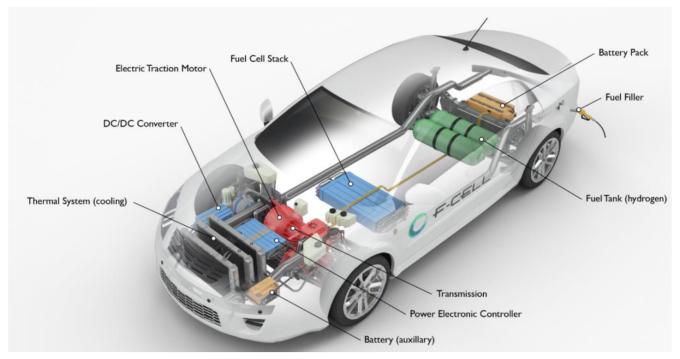30
2020
Hydrogen, the fuel of tomorrow?
When we think about alternative fuels for our vehicles, the first thing that comes in our mind is electric energy, and, therefore, e-mobility. Yet, experts are expecting a lot from hydrogen fuel cell cars.
But how do the hydrogen engines work? Hydrogen fuel cell electric vehicles (FCEV) are propelled by reverse electrolysis, resulting from the reaction of oxygen and hydrogen. Oxygen comes from the air, while hydrogen is stored in one or more tanks built into the vehicle. The results of this reaction are electrical energy - which either powers the FCEV directly or is stored in a battery - heat and water - which are emitted as vapour through the exhaust. In addition, like all other electric and hybrid vehicles, FCEVs can recover braking kinetic energy, reconvert it into electricity, and fill the battery.
What are the current pros and cons of this technology?
ADVANTAGES:
- Purely electrical propulsion and virtually no local emissions:
Driving experience is very similar to that coming from a regular electric vehicle: no engine noise, and full torque right from the start. Also, hydrogen vehicles are locally emissionfree: the only waste product is water vapour. - Quick charging time:
Hydrogen tanks, may they be filled with liquid or gas-form hydrogen, are full and ready to go within 5 minutes. A much better result in comparison with 30 minutes + from BEVs. - Average longer range:
Hydrogen vehicles can go as far as around 500 km with a full tank, a distance that regular electric ones can reach only with very large batteries (at the expense of heavier weight and even longer charging times) - No dependency on the outside temperature:
In fact, the cold weather does not affect the range of hydrogen vehicles
DISADVANTAGES:
- Shortage of refuelling points:
Currently, there are only about 50 fuelling stations in the U.S.A. (mostly in California), and less than 100 in Germany, the nation sporting the largest numbers. - High purchase and operating costs:
The few midtier cars (small cars are not large enough to fit hydrogen tanks) already available on the market cost about twice as high as their traditional and hybrid counterparts. That depends on low demand, resulting in small-volume production, and on cost of platinum, needed as a catalyst during power generation. In addition to that, filling costs are currently comparable with those of gasoline powered engines. - Hydrogen is not so efficient
Hydrogen has to be extracted by water (75% efficient) and, then, has to be compressed, chilled and transported, a process that is around 90% efficient. Once inside the vehicle, the hydrogen is converted into electricity, which is 60% efficient. Finally the electricity used in the motor to move the vehicle is around 95% efficient. Therefore, only 38% of the original energy is used. - Is it so green?
Hydrogen production requires electrical energy. This electrical energy is used to extract hydrogen by water via the process of electrolysis, and often comes from fossil fuels.
Despite a few shortcomings, several experts believe that hydrogen cars, alongside regular electric ones, can play a key role in the future of automotive – provided that the necessary infrastructure is developed and that cost of propeller and vehicles themselves drop down.
MarketingPRO, thanks to its worldwide network and its deep knowledge of the Industry, is up-to-date and ready to support its customers’ decisions, through its distinctive qualitative surveys, comparative analysis, and Market & Competitor Profilings.
If you are willing to “re-fuel” your business, please do not hesitate to contact us.

Competitive intelligenceWilling to drive competitive patterns?
Our competitive intelligence services develop the appropriate analytic tools to take informed decisions.
More
Strategic marketingWilling to exploit your market potential?
MarketingPRO supports successful companies to develop a comprehensive set of strategy and actions to improve sales and revenues.
More
ConsultingWilling to realize your profit potential?
MarketingPRO offers consultancy for Cost Efficiency and Pricing Optimization: more revenues out of improved positioning.
More


